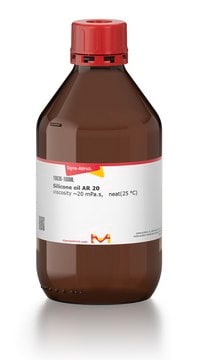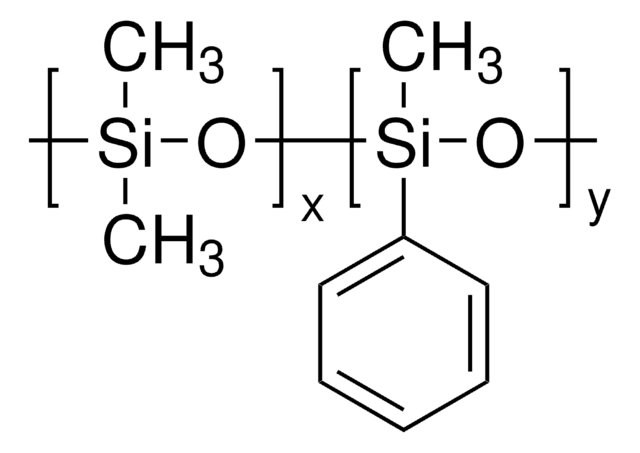378356
Silicone oil
viscosity 50 cSt (25 °C)
Synonym(s):
Poly(dimethylsiloxane)
Sign Into View Organizational & Contract Pricing
All Photos(1)
About This Item
Linear Formula:
[-Si(CH3)2O-]n
CAS Number:
MDL number:
UNSPSC Code:
12162002
NACRES:
NA.23
Recommended Products
vapor density
>1 (vs air)
Quality Level
vapor pressure
<5 mmHg ( 25 °C)
5 mmHg ( 20 °C)
form
viscous liquid
refractive index
n20/D 1.403 (lit.)
viscosity
50 cSt(25 °C)
bp
>140 °C/0.002 mmHg (lit.)
density
0.96 g/mL at 25 °C
Looking for similar products? Visit Product Comparison Guide
Storage Class Code
10 - Combustible liquids
WGK
WGK 1
Flash Point(F)
214.0 °F - closed cup
Flash Point(C)
101.1 °C - closed cup
Personal Protective Equipment
dust mask type N95 (US), Eyeshields, Gloves
Choose from one of the most recent versions:
Certificates of Analysis (COA)
Lot/Batch Number
Don't see the Right Version?
If you require a particular version, you can look up a specific certificate by the Lot or Batch number.
Already Own This Product?
Find documentation for the products that you have recently purchased in the Document Library.
Customers Also Viewed
Daniel Bar-David et al.
Optics express, 26(15), 19115-19122 (2018-08-17)
We experimentally demonstrate light-flow interaction, in which the angular momentum of circulating light excites micro-vortices. In contrast with the solid-phase of matter, where one has to overcome static friction in order to start motion, liquids have no "static drag." Relevant
Florent Badique et al.
Biomaterials, 34(12), 2991-3001 (2013-01-30)
We have recently demonstrated strong nuclear deformation of SaOs-2 osteosarcoma cells on poly-L-lactic acid (PLLA) micropillar substrates. In the present study, we first demonstrated that chemical and mechanical properties of the micropillar substrates have no dominant effect on deformation. However
John R Fowler et al.
The Orthopedic clinics of North America, 44(3), 425-431 (2013-07-06)
Radial head fractures without associated bony or ligamentous injury can be safely treated with internal fixation, if possible, or arthroplasty if nonreconstructable. However, nonreconstructable radial head fractures in association with elbow dislocation and/or ligamentous injury in the elbow or forearm
Karthik R Balakrishnan et al.
Lab on a chip, 13(7), 1302-1307 (2013-02-07)
Resistive-pulse sensing (RPS), which is based on measuring the current pulse produced when a single particle transits a pore or channel, is an extremely versatile technique used to determine the size and concentration of cells and viruses and to detect
Amir Sanati Nezhad et al.
Proceedings of the National Academy of Sciences of the United States of America, 110(20), 8093-8098 (2013-05-01)
Tip-growing cells have the unique property of invading living tissues and abiotic growth matrices. To do so, they exert significant penetrative forces. In plant and fungal cells, these forces are generated by the hydrostatic turgor pressure. Using the TipChip, a
Our team of scientists has experience in all areas of research including Life Science, Material Science, Chemical Synthesis, Chromatography, Analytical and many others.
Contact Technical Service




